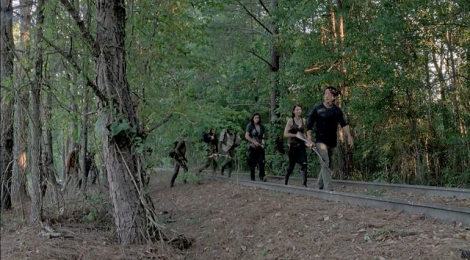
Zombies in the Wilderness
When I think about wilderness, I now think of Georgia. And I think of the zombie apocalypse. One of my favorite shows is “The Walking Dead”, most of which takes place in the forests and overgrown towns of Georgia after a virus has turned most of the human population into undead monsters.
The main characters spend a lot of time out in the wilderness, camping out, scavenging for food and water and stability, being generally dirty and emotional. But sometimes they come across other groups who have organized themselves into little civilizations with leaders and rules. These small civilized groups usually barricade themselves in towns or buildings with tight security to keep the wilderness at bay–with guns and lookouts and boobie traps designed to keep the dangerous zombies out.
But one of the most interesting themes in the series is that the greatest dangers and the greatest evils lie not in the wilderness with its biting, death trap zombies. Instead, the greatest threats lie within the walls of “civilization”, where people often trade security and a constant food supply for unquestioned leadership that usually turns out to be insane, manipulative, and violent.
Perhaps it is the great danger of human community and institutions and “civilization” to offer stability at the expense of love, justice, and courage. We certainly see this in some of our Lenten studies this season, in which we are focusing on racism, violence, and criminal justice. On the underbelly of “civilization” we often find war, forced labor, and neighborhoods segregated by class, race, and police attention.
I was recently talking with the Rev. Hermon Darden, who pastors in a community of color in New York City and will be one of our “Community-Police Relations” panelists on March 8. I said something about all the recent tensions between people of color and police since the deaths of Michael Brown and Eric Garner (and the non-indictments of then police officers who killed them). Rev. Darden wisely reminded me, “There’s been tension for a long time. It’s only recently that some of you have started noticing.”
It’s amazing how some of us who get to live in the more privileged parts of our “civilization” can be completely oblivious to the costs of the systems that make us feel “safe”. Because our society gives us what we want, we can can ignore how our comforts and privileges come at the expense of others. We can ignore how much love, justice, and courage are sacrificed to the gods of security, comfort, and segregation. That is the value of stepping away from the comforts of civilization and wandering into wilderness.
This Lent, our theme is “Real Talk in the Wilderness”. We’ll be looking at different wilderness images in the Bible as well as talking about that unpredictable, liminal, wilderness place we are now finding ourselves with the discussion of racial justice in our nation. Today, we as a country have been somewhat dislodged by the shootings of unarmed black men as well as the murders of police officers into the unpredictable and chaotic space of tension and argument and confusion. It is just where we should be. Outside the civilized shackles of polite political correctness and just enough justice, we have been thrust by historical circumstance and diligent movement building into the wilderness to discern how it is we will move forward together. Like Jesus after his baptism, the Spirit has led us away from our status quo into a season of discernment, testing, and preparation. And, like fasting in the wilderness with the devil, this time for us is full of struggle and discomfort and “Real Talk”. But it is necessary if we are to emerge from the wilderness a more civil civilization that strives for the safety and flourishing of all.
So, while we may recognize the raw struggle and dirt of the wilderness this Lent, we will also sometimes celebrate the freedom wilderness offers to engage in “Real Talk” and to grow and change as individuals and as a society.
(And maybe sometimes we’ll have to talk about zombies too.)
Join us this Lent as we explore “Real Talk in the Wilderness”, with a major focus on racial justice (including studies on The New Jim Crow: Mass Incarceration in the Age of Colorblindness and The Cross and the Lynching Tree). As a part of our exploration, we will hold a Community-Police Relations Sunday, which will include worship at 10:30am and a community forum “Where Do We Go From Here?” at 1pm.
Photo from “The Walking Dead” Season 5.
